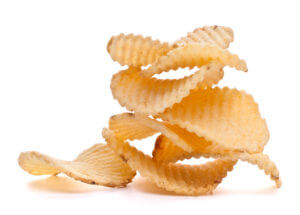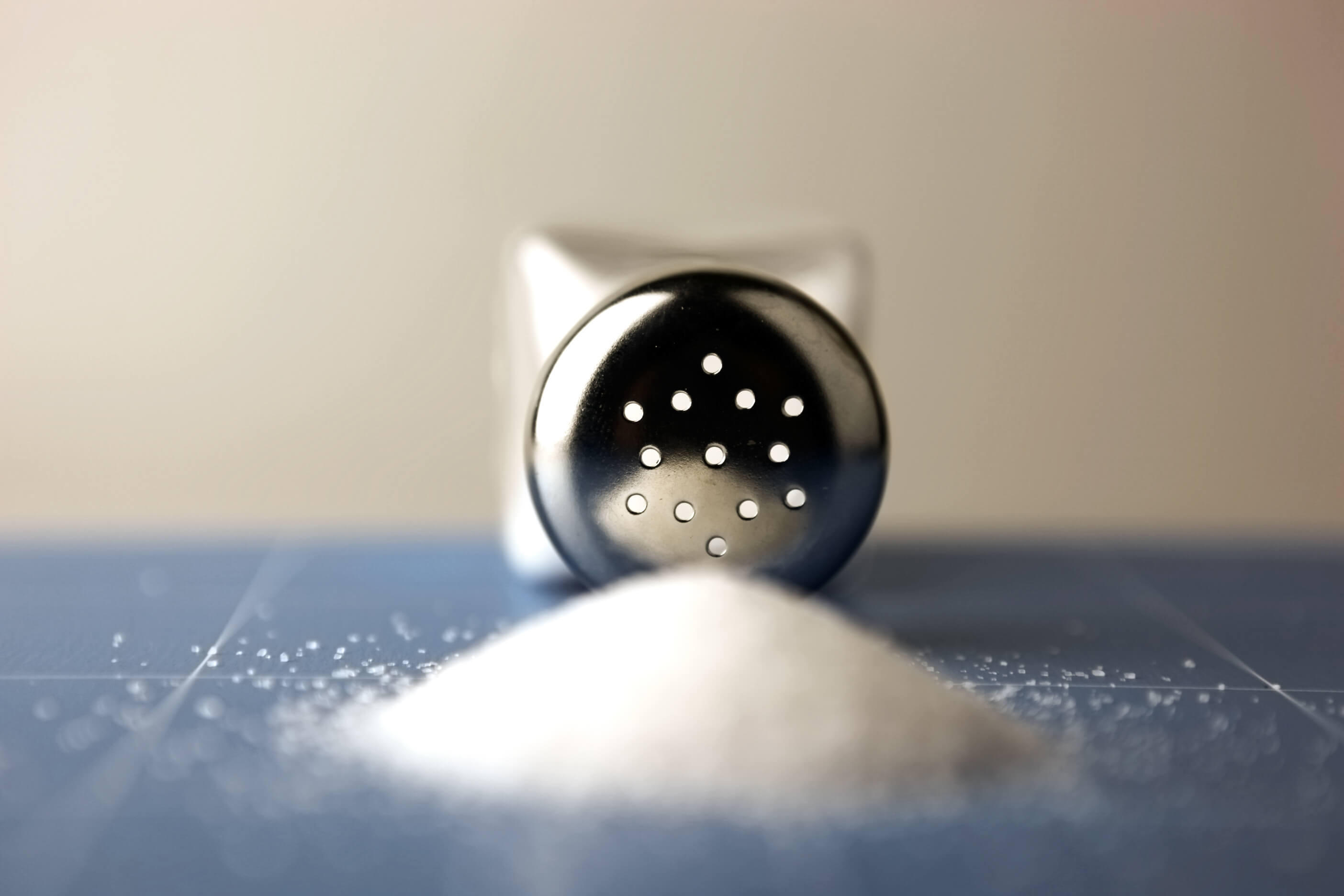Let me start by saying I’m a salt-o’holic. Since I was 5 years old and watched my father salting his salad (I thought hey, salad doesn’t taste good, if he salts it maybe that helps. It did!) I’ve been hooked. I have hypertension and know it’s bad for me to consume this much. So now comes the ‘I recommend you do as they say, not as I do’ advice. Actually I have cut way back on salt lately, but it isn’t the first time, it often doesn’t last very long.
We need salt, it is a requirement for life, but we really don’t need much more than what is contained in the natural food we eat. Our gut (and microbiome) can probably handle a little more, but we shouldn’t indulge in much more than that on a daily basis. I’ve seen several websites and Facebook pages suggesting that people should consume large amounts of salt, actually drink glasses of salt water several times per day! This is suppose to fix some condition or another according to the authors. What do all of these sites have in common? Very little, or usually, no, scientific research to back up their claims.
People using huge amounts of salt to treat various conditions are basically covering up their symptoms. Taking heroin daily to cover up aches and pains isn’t a good idea either. Salt is not an internal medicine unless you are deficient (and very few people are). It puts a huge load on the kidneys and every cell in the body.
“A Western lifestyle with high salt consumption can lead to hypertension and cardiovascular disease. High salt may additionally drive autoimmunity by inducing T helper 17 (TH17) cells, which can also contribute to hypertension. Induction of TH17 cells depends on gut microbiota… Here we show that high salt intake affects the gut microbiome in mice…In line with these findings, a moderate high-salt challenge in a pilot study in humans reduced intestinal survival of Lactobacillus spp., increased TH17 cells and increased blood pressure. Our results connect high salt intake to the gut–immune axis and highlight the gut microbiome as a potential therapeutic target to counteract salt-sensitive conditions.”
Autoimmune encephalitis causes subacute deficits of memory and cognition.
“a HSD boosts TH17 generation and exacerbates actively induced experimental autoimmune encephalomyelitis” — Nature Published 30 November 2017
If we don’t have a strong microbiome, or we have poor microbiota diversity, it can effect our ability to produce hormones.
“a moderate high-salt challenge in a pilot study in humans reduced intestinal survival of Lactobacillus spp., increased TH17 cells and increased blood pressure. Our results connect high salt intake to the gut–immune axis and highlight the gut microbiome as a potential therapeutic target to counteract salt-sensitive conditions…
There are monoamine-containing enterochromaffin cells in the mucosa and submucosa of different portions of the stomach and small intestines. The gut microbiota can influence the ability of enterochromaffin cells to produce serotonin, dopamine, and norepinephrine that can influence the behavior of the host, termed brain gut microbiome axis and renal function, termed gastrorenal reflex. The absence of gut microbiota has been reported to increase anxiety-like behavior and decreased dopamine turnover in the frontal cortex, hippocampus, and striatum in response to acute stress in rats… Gut microbiota can influence the production of monoamines by enterochromaffin cells. The gut production of serotonin, dopamine, and norepinephrine can affect not only the behavior of the host (brain-gut axis) but also the ability of the kidney to excrete a sodium load (gastro-renal axis).” — PubMed ID#PMC4578629
“In the third study, a group led by Dr. David Hafler discovered that increased salt concentrations boosted the development of both mouse and human naive T cells into Th17 cells. This led them to explore the molecular pathways involved in Th17 cell development. They also found that mice fed a high-salt diet developed a more severe form of EAE (autoimmune encephalomyelitis)… The incidence of certain autoimmune diseases in our society, including multiple sclerosis and type 1 diabetes, has been rising over recent decades. This research suggests that one factor may be that we now eat more processed foods with high levels of salt.” — NIH.GOV
 Too much salt can also lead to gastritis, h.pylori and even stomach cancer. Several studies have shown that a high salt diet can worsen an existing h.pylori infection.
Too much salt can also lead to gastritis, h.pylori and even stomach cancer. Several studies have shown that a high salt diet can worsen an existing h.pylori infection.
“a high dietary salt intake enhances H. pylori-induced carcinogenesis. The observed effects of a high-salt diet on H. pylori-induced gastric cancer in the gerbil model correlate well with human epidemiologic data, which have repeatedly shown increased rates of gastric cancer in persons who consume a high-salt diet (25–30). The high-salt diet used in this study (8.75% sodium chloride) approximates the concentration of sodium chloride in some foods consumed by humans. For example, dried fish is often preserved in 3 to 20% salt, pickled foods contain up to 25% salt, and soy sauce contains 19% salt… Previous studies have reported that exposure of H. pylori to high-salt conditions in vitro leads to alterations in the expression of multiple H. pylori genes, including cagA (22). In the current study, we observed that cagA gene expression was elevated in the stomachs of WT-infected animals maintained on a high-salt diet compared to WT-infected animals maintained on a regular diet” — PubMed ID#PMC3676043
If you are familiar with the fermentation of foods it should be easy to see how consuming large amounts of salt can drastically change the microbiome. Salt is used in fermentation to limit what bacteria will grow to a very narrow spectrum of bacterial species. Our gut does the same same thing by maintaining a low (acidic) pH. High amounts of salt lowers the pH, but it also harms many strains of bacteria that should be living in our gut.
Needless to say this dramatic shift in the microbiome is not healthy in other regards as well. Too much salt will certainly hold down diversity, and diversity is known to be a strong marker for good gut health and a lower risk for IBS/IBD. The strains that are held back by this high salt intake are not yet well documented, but some could be very important for good health. For instance, the studies showed that the low diversity caused by high salt intake led to anxiety symptoms in the mice being studied.
In conclusion, too much salt in the diet can throw off the microbiome. One of the many affects of this is increased blood pressure. This action is separate from the well known ability of excess salt to cause water retention. This can also change our epigenetics and cause us to become salt-sensitive, and perhaps lead to autoimmune conditions. Does this mean we should quit eating salt? No, but it might not be a good idea to supplement it (like several unscientific protocols suggest people should be doing), consume less processed foods (and there are many reasons to do to that), and perhaps put the salt shaker away and use herbs and spices instead.
All images posted by John Herron are either "Copyrighted John Herron", or are copyrighted by someone else and are used under license. So please don’t use them elsewhere, you’ll get in trouble.


 Phage Complete comes with a full 30 day money back guarantee, for U.S. purchases this includes the original shipping charges to you!
Phage Complete comes with a full 30 day money back guarantee, for U.S. purchases this includes the original shipping charges to you!
Hi my name is Bob I’ve been dealing with low blood pressure for years I’m was told to take increase my salt now have been having intestinal problems can you give me any ideas what I should talk to my doctor on what to do. Thank you
Added salt is used to increase the volume of blood (due to water retention in the cells), which increases blood pressure. This only works to an extent, and for some people, doesn’t work at all, or stops working after a couple of months. If you check your blood pressure on a regular basis at home, and adding salt doesn’t help increase your blood pressure, then ask your doctor if you need to continue adding salt.
Refined white table salt is not good. Sea salt contains trace minerals which you need and are good for you.
Refined table salt is heavily processed to eliminate trace elements. It is mined from underground salt deposits and is bleached, heated and contains additives.
Here is Dr. David Brownstein on sea salt:
https://www.youtube.com/watch?v=3nBH7Crkzxk
He says we need about a teaspoon a day.
In this “Salt Your Way to Health” lecture by David Brownstein, M.D., he mentions the health benefits of ingesting the correct type of salt:
This is, in practice, a myth. The amount of trace minerals found in sea salt is so small as to be biologically insignificant. The top 6 minerals other than sodium and chloride are: sulfur, magnesium, potassium, calcium, silicon. But in very small amounts, these 5 minerals combined make up less than 2% of sea salt and can be
easily
found in foods in much higher quantities. For example, a tsp of real sea salt contains 20mg of magnesium, half an avocado contains 29mg, as well as 975mg of potassium, a ton of other vitamins, minerals, beneficial fats, etc!
Our ancient ancestors did not add salt to their food, they ate it as it came.
Our ancestors have been mining, transporting, and using unrefined salt since the neolithic period. Humans followed game trails to salt deposits and made settlements there.
Restriction of sodium is not shown to be beneficial, and has actually been shown to be harmful, with increased mortality of heart falure patients in the sodium restricted population. Unrefined salt contains dozens of trace minerals that change the way the body processes the sodium, and does not result in major effects on blood pressure or hormones controlling fluid/mineral balance like refined salt. I’d love to see a study comparing the effects on gut microbiota of unrefined vs refined salt. The majority of salt consumed by the average American, approximately 75%, is from processed foods, which we know are not healthy and negatively impact gut microbiota. Toxic food additives and contaminates are likely driving the autoimmunity rates far more than a nutrient necessary for life. If researchers look long enough, they can find correlations everywhere, so all studies should face severe scrutiny. I’m pretty sure I could write a convincing study about breathing air causing aging. That said, here are a couple interesting studies:
https://www.ncbi.nlm.nih.gov/pmc/articles/PMC5328355/
http://heartfailure.onlinejacc.org/content/4/1/39
The first study you mention concludes with the following:
“sea salt intake induced less hypertension than refined salt and caused less damage to the heart and the kidney. It is likely that the major beneficial effect of sea salt is associated with the mineral content of the sea salt that is known to be anti-hypertensive such as potassium, calcium and magnesium.”
Sea salt still caused hypertension, still caused damage to both the heart and kidneys. The minerals in sea salt are “trace” amounts, and are very common in the diets of most people “potassium, calcium and magnesium”. The trace amounts received from consuming sea salt will not have the same benefits as those in the mouse study (in a highly controlled laboratory diet). I actually consume pink salt, mostly because it taste better and looks better in the shaker (though I rarely use the salt shaker any more). But I don’t fool myself that it is really more healthy; I get plenty of minerals from a healthy diet. If someone needs these minerals there are plenty of supplements available that would actually help rectify a deficiency.
The article presented here was concerned with gut health and the Standard American Diet (SAD), which is already very high in sodium. It does
not advocate a “salt restricted” diet. Few people in Western countries need to supplement extra salt. As a reformed salt-oholic I can tell you scaling back has had noticeable health benefits.